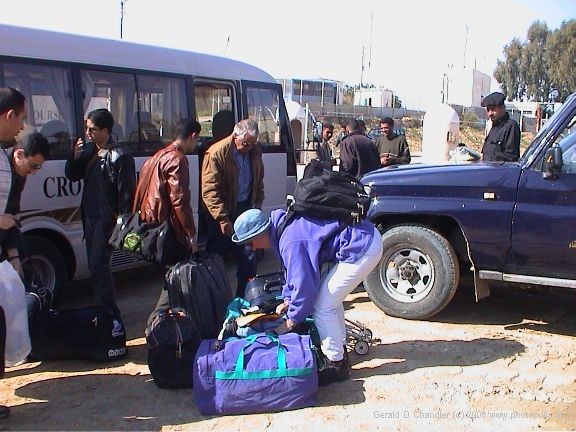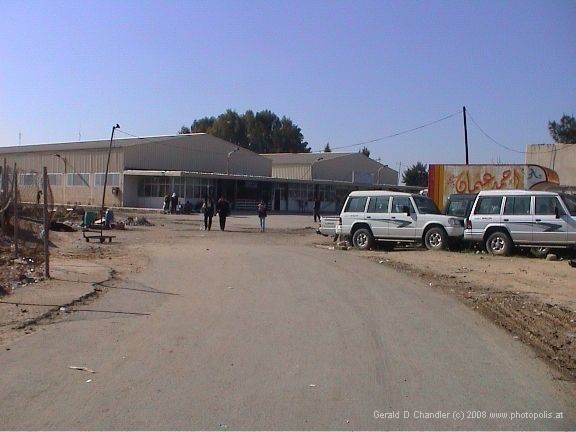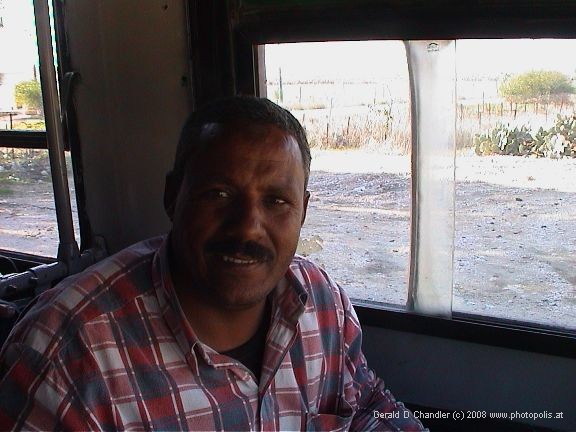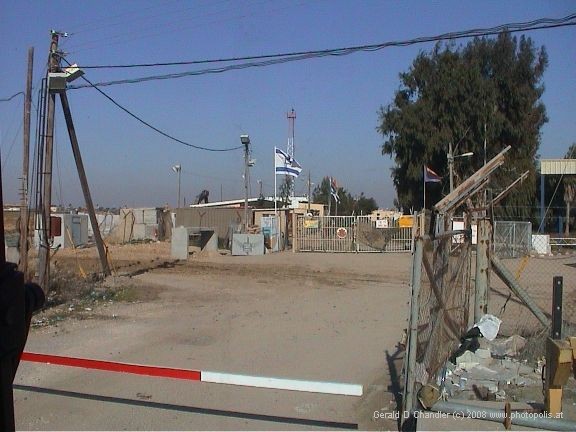Home | Front Page | Blog | Index | New | Contact | Site Map
Sharm El Sheikh
Ras Snorkeling
Upper Egypt
Nile Cruise
Cairo
Egypt Security
Israel Bus & Border
Foto Show

Egypt
Israel
Turkey
Bulgaria
Romania
Ukraine
Poland
Prague
Britain
USA 2002
Travel Map
It is no secret that we have crossed our share of borders in the past two and a half years. We have crossed many by plane of course, a couple by boat, and the rest on foot. But the worst of them all was the most recent and it was by bus. Picture two border posts 200 meters apart and try and figure out how it can take two hours to travel 200 meters.

Bus and Jan at Egypt-Israel Border |
The border in question is the one between Egypt and Israel at Rafah, on the southern edge of Gaza. We had arrived at the Egyptian border by bus from Cairo at about 12:45. There were seven in our group: A Canadian, four Israeli Arabs (two studying medicine in Cairo), and ourselves. The border formalities were slow, but at each stage the time it took could be fairly reasonably estimated based on the line of people ahead of us. Thus, we went through the baggage search, passport check, and after some delay in processing the passports of our Israeli Arab companions, we found ourselves at the last stage standing in line ready to board the bus that was to take us to the Israeli side of the border.
We were all a little miffed when we learned that we were to be charged 10 Egyptian pounds or US$2 for the privilege of riding the bus for 200 meters but had all accepted the inevitable. We could see a rather beat-up looking bus being loaded ahead of us and we were probably standing behind about 20 other passengers. After about ten minutes of waiting with very little reduction in the length of the line ahead of us, our ‘minder’ appeared beside us. Dressed in black with a walkie-talkie permanently in his hand, he was responsible for shepherding us through border controls and seeing that we arrived safely on the other side of the border.

Egyptian Inspection Building from exit side |
When he saw the length of the line in front, he immediately decided we should queue jump and led us past all of the poor people standing patiently in line, past the security check, and past the bus that was being loaded, gathered us in a group and set off, we presumed in search of transport. Shortly thereafter he returned followed by a bus that he told us to board. We had just started putting our bags into the luggage compartment when another man brusquely told us to take them out. The two men conferred and we were told to take the bags out and wait a little longer. By this time, we had been waiting for almost a half hour. What difference would another few minutes make? We found some shade and sat enjoying the warm afternoon air.
After about five more minutes, our minder came back and lo and behold walked us over to the self-same bus that he had proudly marched us by 20 minutes earlier. This bus, which had seemed full 20 minutes before, now seemed full to overflowing. The baggage compartments underneath the bus were filled to capacity. The last three rows of seats were piled high to the roof with bags of all shapes and sizes. All seats were taken and perhaps one or two people were standing in the aisle. At this point we were told to give our bags to the baggage man and board the bus. Seeing how little room there was in the baggage compartments and unwilling to consign our bags to an unknown fate, we asked if we could take the bags on board with us instead. A reluctant nod was enough to spur Jan to struggle on board with her two duffle bags and small backpack before anyone could change their mind. As she boarded she could hear the bus organizer asking Gerry for the ten pound fare for each of us. That was the last she saw of Gerry for about an hour.
One or two friendly hands helped her haul her bags up the steep steps onto the bus and she then managed to slide her bags, one on top of the other as far down the aisle as she could go. Two thirds of the way she stopped when her bags met the wheels of a wheelchair folded and stored in the aisle in front of the wall of bags. And there she expected to stay. One by one, the other six members of our party had also struggled on board, some with, some without there own bags. After much shouting back and forth, Jan satisfied herself that Gerry was also on the bus before she could allow herself to relax a little.
But next thing we knew, the bus organizer was trying to get more people on board and was signalling frantically to Jan to move down the bus. Her body language was unmistakable: “No way, Ahmed!”. There ensued much discussion in Arabic, which culminated in the wheelchair being lifted from the aisle onto the shoulders of the aisle passengers in the last two rows. On cue, Jan moved her bags and herself another three feet down the aisle until she met the wall of bags. And there she stayed. And stayed. And stayed.

Egyptian Border bus driver |
While Jan was getting shoved farther and farther back in the bus Gerry was resolutely glued to the front of the bus. When he got on there were numerous large cans, maybe 40 liters each, in the space between door and driver. He found a spot to plant his feet and refused to shoved back into and among the sardines. But as time went on more and more people came and the space in the front of the bus became filled with people to such an extent that Gerry could no longer even move his feet. Gerry was almost into the face of the driver, who started to talk to him — in Arabic. Soon they were joking together, each in his own language, somehow seeming to understand each other.
Altogether, we must have waited there on the bus for more than half an hour. Conversation soon started with the seated passengers who claimed that they had been sitting there for an hour already. But they were very sanguine about it saying that only a week ago it had taken six hours to get across the border and once even eleven hours! They were all Palestinians crossing the border to get back to their homes in one of the towns in Gaza. But don’t worry they kept saying. We will soon be on the Israeli side and then everything will be easy. How ironic that in spite of the ill-feeling that exists between Palestinians and Israelis, they so readily acknowledged the superior organizational abilities of the Israeli side.

The Promised Land |
Eventually, the waiting came to an end as the bus engine started up and we moved — two meters! Another wait for who knows what and then more movement until finally we were just outside of the Israeli gate. And then we stopped again. Seeing Jan's frustration, a fellow passenger explained kindly that we were just waiting for the security services to finish checking the bus in front and then it would be our turn. Gerry up front, almost in the driver’s lap, saw that he too was impatient. With a wave of the hand to a young Israeli woman beyond the coved gate he indicated she should open it. And she, with a broad smile, showing she knew the driver, and a tip of the head, indicated it wasn’t time yet. But in just a few more moments, it happened. The gate opened and the bus crossed the final frontier and we all happily tumbled out of the bus.
After the fact in talking to our Israeli Arab companions, we were told that the excessive crowding was because this was the last bus of the day. We never learned whether that meant the last the Egyptians were willing to send, or the Israelis were willing to receive. We only knew that in the same length of time, any self-respecting European country could have filled and dispatched twenty buses. Such is life in the Middle East.